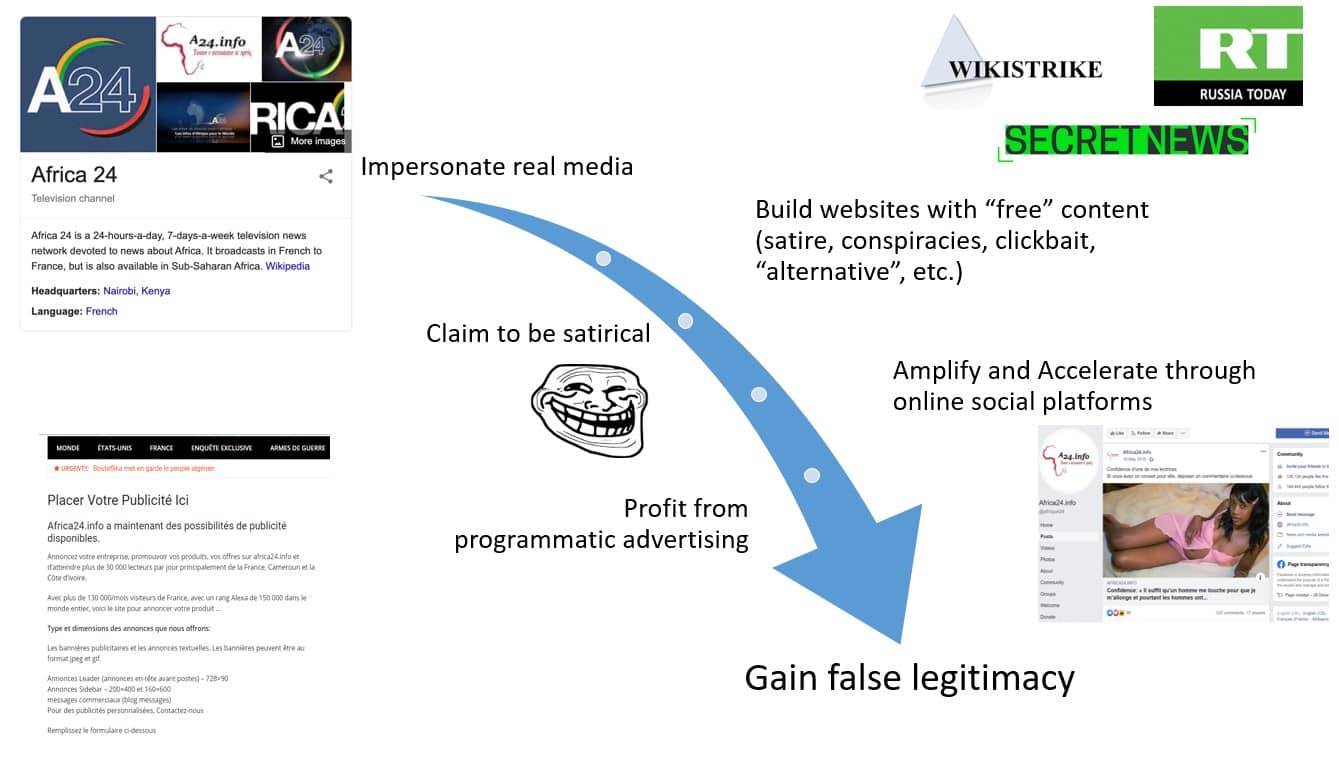How an Africa-based network built fake media outlets and clickbait health scams for profit
Today, in cooperation with France24, we released our investigation into Africa24 – a network that spreads health disinformation and conspiratorial content in order to make a profit. This network has a dozen of websites, ranging from health scams involving the sale of home remedy books to “sexo” clickbait. What’s more, trying to take advantage of the coronavirus crisis to attract a greater audience, 24jours – a website part of the network – was recently fact-checked for an article, which falsely claimed that “hundreds of Italians are moving to Africa to escape the #coronavirus”. To summarise, the network has used increasingly common disinformation techniques, such as:
- Playing on the edge of satire to bypass disinformation counter-measures;
- Spoofing names of legitimate media to mislead people;
- Syndicating content from Russia Today, Sputnik, and other controversial sources, and
- Using Facebook for content amplification.

Interested in knowing more?
- Check out France24’s coverage (article in French).
- See our Twitter thread for all the technical OSINT details.
A Wolf in Sheep’s Clothing: Russian Troll Farms
Last week, CNN released an exposé on Russian troll farms operated from Ghana and Nigeria charged with the task of inflaming societal divisions in the run-up to the US presidential election. As similar to the 2016 Russian IRA operation, the farms disseminated content that promoted black empowerment and displayed anger towards white Americans. The trolls pretended to be based in the US, but in reality, were located in Ghana at a premise rented by an NGO – one which turned out to have strong links with the farms. Facebook’s Nathaniel Gleicher told reporters that the network’s technique appeared “to be attempting to create an NGO that had real-world people working for it on the ground in Ghana as a way to build legitimacy for their narratives and use that to message out”. In similar news, BBC News recently looked into whether evidence suggested that the Russian government was directly involved in the 2019 UK general election with the leaked US-UK trade documents. In sum, attribution is difficult but it could be that the perpetrator has links to the Russian state.
Coronavirus Infodemic
- The UK government has set up a unit to tackle coronavirus disinformation invested with the task of establishing the extent and impact of false or manipulated information aimed at misleading people for “either for the purposes of causing harm, or for political, personal or financial gain”.
- Facing the coronavirus crisis, online platforms are taking unprecedented actions to chase false information and surface reliable content in partnership with health authorities.
- A new Bellingcat OSINT investigation debunks a viral video supposedly showing shoppers forcing their way into a supermarket to buy goods due to COVID-19. Bellingcat rightly warns that a video like this could incite mass panic in people.
Good reads
- In the lead up to the Polish presidential elections, Stanford University researchers have followed the key election narratives across Facebook Pages and Groups, and found that content related to far-right candidates makes up a greater percentage of general Facebook content than of content on mainstream outlets’ Pages. They also drew attention to how one far-right network uses 17 Facebook Pages and content farms to boost its candidate in the elections.
- How is the radical right using the COVID-19 pandemic to advance their political agenda? This piece looks at the conspiracy theories and narratives on the coronavirus used by prominent US right-wing figures to stoke societal fears of globalisation and multiculturalism and fuel xenophobia.
Studies
- A new study looks at how a disinformation narrative spreads in the face of doubt or scepticism from online communities, finding that despite the existence of scepticism towards the narrative, the spread of disinformation persisted. The authors attribute this factor to the digital architecture of online platforms and decentralised communication, which enable the spread of disinformation.
- Information Operations and Online Activism within NATO Discourse: In analysing Twitter conversations about NATO, Kate Starbird sheds light on the structure and dynamics of information operations that masked as organic “online activism” in order to blend in with online communities and shape political discourse.
Events and Announcements
- First Draft has launched a Coronavirus resource hub for journalists.
- EU Cybersecurity Agency (ENISA) shares cybersecurity tips for when working remotely.


